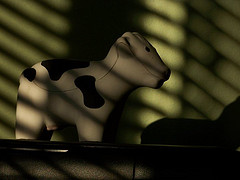USDA: "No Cause For Alarm" In California Mad Cow Case

(gblahe)
You may have heard that officials have confirmed one case of bovine spongiform encephalopathy, better known by its headline-friendly nickname “mad cow disease,” in California; the first such incident since 2006. And even though BSE can be fatal to humans that eat tainted meat, the USDA says they have found no cause for mass concern.
“There is really no cause for alarm here with regard to this animal,” the agency’s chief veterinary officer told reporters earlier today.
BSE is often contracted when non-mad cows chow down on infected feed, but the USDA vet says that doesn’t appear to be the case in California.
The BSE was diagnosed when the cow in question was tested at a rendering plant. As of today, regulators are not saying where the particular animal was raised. Authorities in Canada and the UK have been notified.
Dr. Michael Hansen, senior scientist at Consumers Union, said in a statement that the latest BSE discovery highlights some concerns with how the USDA tests for the disease:
First, the USDA testing program for mad cow disease is way too small. USDA only tests some 40,000 cows a year of the millions slaughtered annually. So we really don’t know if this is an isolated unusual event or whether there are more cases in US beef. Our monitoring program is just too small.
Second, detection of BSE is needlessly hindered by the fact that USDA prohibits private companies from testing their own beef. Private testing could augment USDA testing and provide an extra measure of monitoring and assurance of safety to consumers. USDA only tests cattle that are sent to the renderer and doesn’t test at slaughterhouses. We find it hard to understand why USDA prohibits private companies from testing.
Third, the ruminant to ruminant feed ban in the US to prevent spread of mad cow disease is inadequate. Cows can’t be fed to other cows, which is a good thing. But remains of cows can be fed to pigs and chickens, and pig and chicken remains can be fed back to cows. We believe this could allow for the spread of mad cow disease.
Mad cow disease confirmed in Calif. dairy cow, USDA says
[USA Today]
Want more consumer news? Visit our parent organization, Consumer Reports, for the latest on scams, recalls, and other consumer issues.

